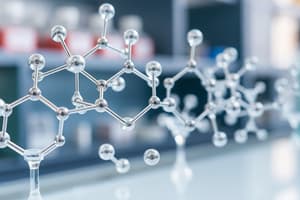Podcast
Questions and Answers
What is the main focus of inorganic chemistry?
What is the main focus of inorganic chemistry?
Non-organic substances, materials, and elements that do not contain carbon
Who identified oxygen as an element in 1774, marking a significant milestone in inorganic chemistry?
Who identified oxygen as an element in 1774, marking a significant milestone in inorganic chemistry?
Antoine Lavoisier
What is crystallography and how does it contribute to inorganic chemistry?
What is crystallography and how does it contribute to inorganic chemistry?
The study of crystal structures and their properties; It leads to a deeper understanding of materials' physical and chemical characteristics.
What is coordination chemistry and what does it focus on?
What is coordination chemistry and what does it focus on?
Who is known as the 'father of modern chemistry'?
Who is known as the 'father of modern chemistry'?
What did Dmitri Mendeleev develop that has been instrumental in organizing and understanding the properties of elements?
What did Dmitri Mendeleev develop that has been instrumental in organizing and understanding the properties of elements?
Which notable inorganic chemist made significant contributions to the study of radioactive elements?
Which notable inorganic chemist made significant contributions to the study of radioactive elements?
What field did Linus Pauling make significant contributions to?
What field did Linus Pauling make significant contributions to?
Name one application of inorganic chemistry mentioned in the text.
Name one application of inorganic chemistry mentioned in the text.
In which field are inorganic compounds used as contrast agents in medical imaging?
In which field are inorganic compounds used as contrast agents in medical imaging?
Study Notes
Exploring Inorganic Chemistry: The Fascinating World of Non-Organic Molecules
Inorganic chemistry, a subdiscipline of chemistry, deals with the study of non-organic substances, materials, and elements that do not contain carbon in their composition. This vast field of study encompasses a wide range of topics, from minerals and metals to chemical compounds and complex systems. Here's a detailed exploration of inorganic chemistry, touching on its history, key concepts, and applications.
History
Inorganic chemistry has a rich history, dating back to alchemy and early civilizations' interest in precious metals and minerals. The study of inorganic compounds began in the early 18th century, with Antoine Lavoisier's identification of oxygen as an element in 1774. This discovery marked a significant milestone in the field, as it highlighted the importance of understanding the behavior and properties of non-organic materials.
Key Concepts
Inorganic chemistry is founded on several core concepts and ideas:
- Crystallography: The study of crystal structures and their properties, which has led to a deeper understanding of materials' physical and chemical characteristics.
- Mineralogy: The study of minerals, metals, and their composition and properties.
- Ceramics: The study of ceramic materials, which include materials like glass, porcelain, and crystals.
- Coordination Chemistry: The study of metal complexes and their structures, properties, and synthesis.
- Materials Science: The study of the properties and applications of materials, including metals, alloys, and ceramics.
- Solid-state chemistry: The study of the properties and reactions of substances in their solid state, such as minerals and crystals.
Applications
Inorganic chemistry has a myriad of applications in various fields, including:
- Materials Science: Inorganic materials are used in various applications, such as computer chips, batteries, fuel cells, and solar cells.
- Pharmaceuticals: Inorganic compounds like metal ions, organic-inorganic hybrid materials, and nanoparticles are used in drug delivery systems, imaging agents, and as catalysts.
- Environmental Science: Inorganic materials play a crucial role in environmental remediation and pollution control.
- Biotechnology: Inorganic compounds are used as contrast agents in medical imaging, such as MRI and CT scans.
- Energy: Inorganic materials are used in renewable energy applications, such as solar cells, fuel cells, and batteries.
Notable Inorganic Chemists
Several notable inorganic chemists have made significant contributions to the field, including:
- Antoine Lavoisier: Known as the "father of modern chemistry," Lavoisier identified oxygen as an element in 1774.
- Dmitri Mendeleev: He developed the periodic table of elements, which has been instrumental in organizing and understanding the properties of elements.
- Marie Curie: The first woman to win a Nobel Prize and the only person to win it in two different scientific fields (physics and chemistry), Curie made significant contributions to the study of radioactive elements.
- Linus Pauling: Winner of two Nobel Prizes (chemistry and peace), Pauling made significant contributions to the study of crystal structures and the role of coordination chemistry in biological systems.
In conclusion, inorganic chemistry is a fascinating field that has applications in various fields, from materials science to environmental science and pharmaceuticals. As researchers continue to explore the properties and behavior of non-organic materials, we can expect to see even more exciting discoveries and applications in the future.
Studying That Suits You
Use AI to generate personalized quizzes and flashcards to suit your learning preferences.
Description
Test your knowledge on the captivating world of inorganic chemistry through this quiz that covers the history, key concepts, applications, and notable inorganic chemists. Learn about crystallography, mineralogy, coordination chemistry, materials science, and more.




